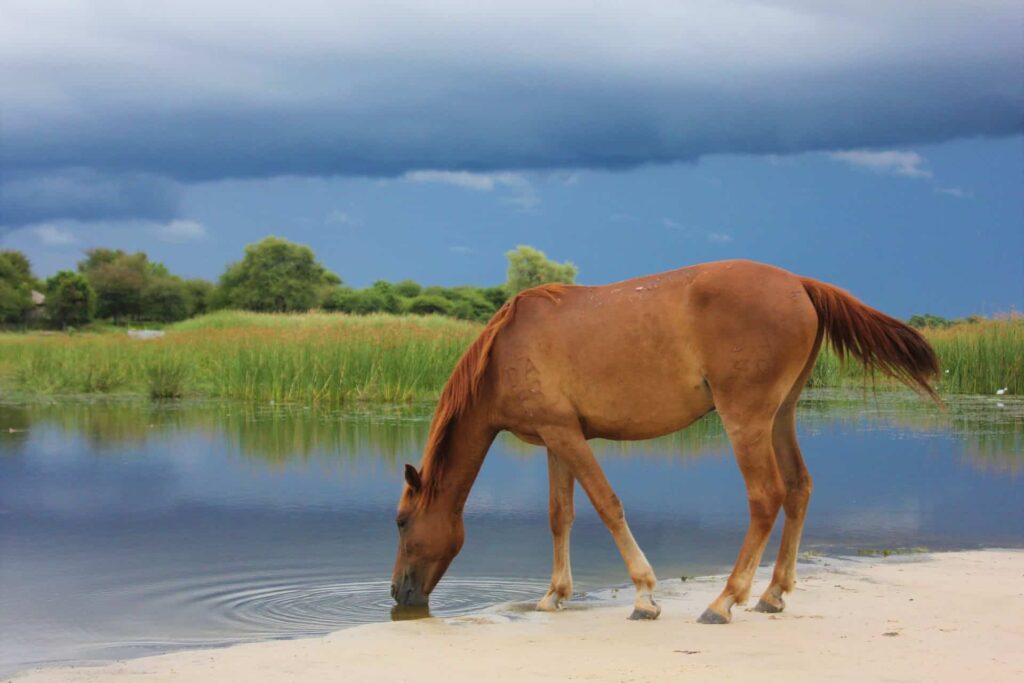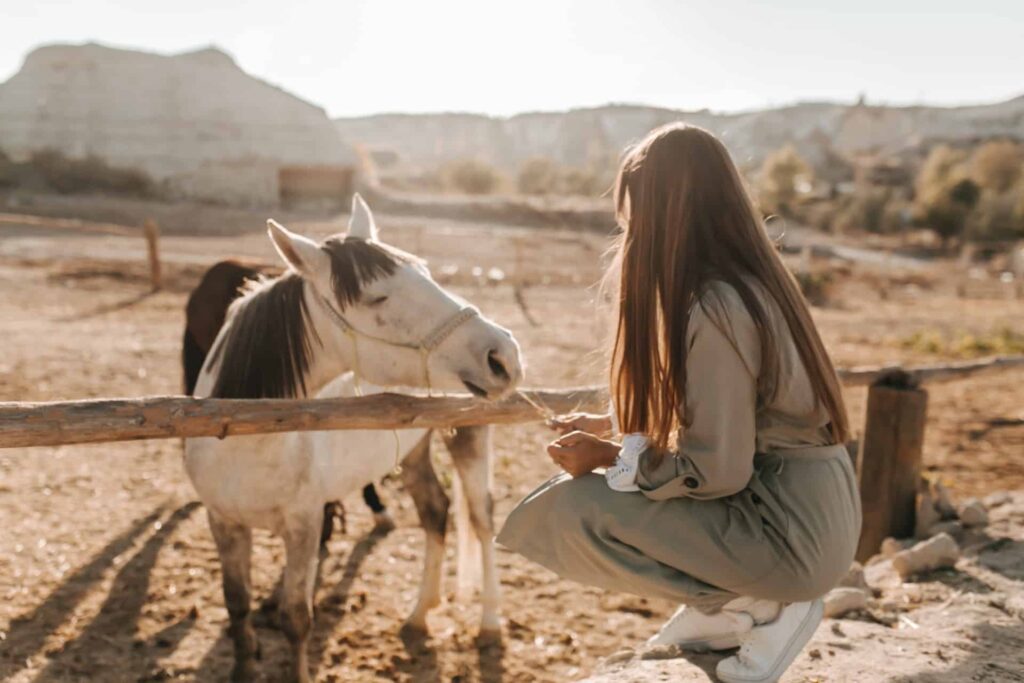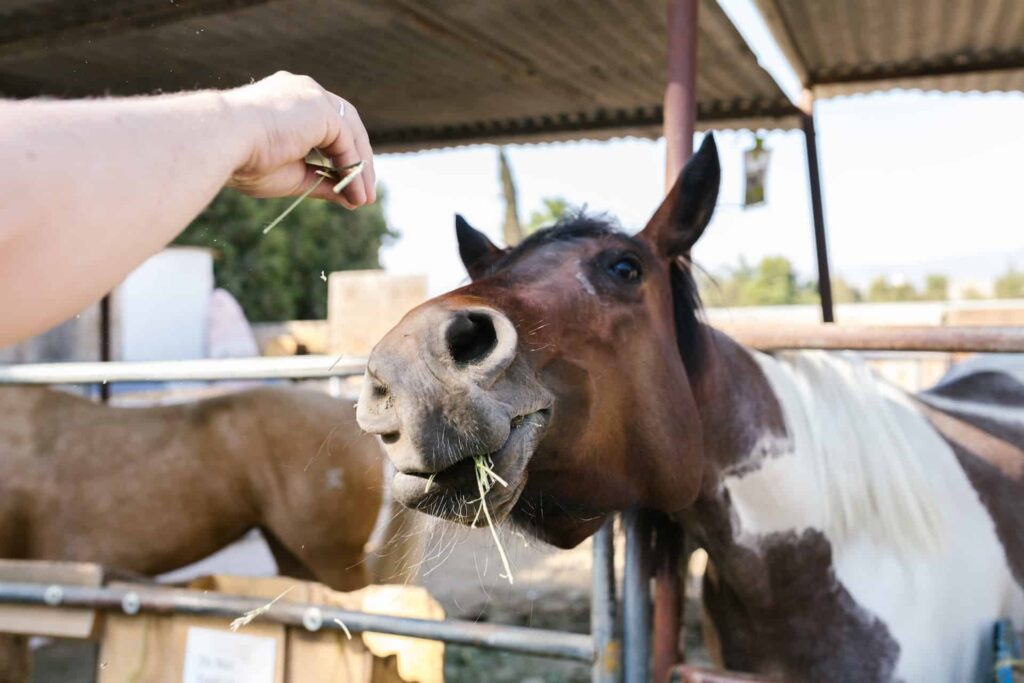Hydration is a crucial aspect of horse care, as water is one of the most important factors for horses to maintain health. An understanding of how long can horses go without water and the factors affecting their water intake is vital for horse owners and caretakers. Dehydration can have serious consequences on a horse’s health, so it’s important to know how long a horse can go without water, what water sources are appropriate, and how to maintain proper hydration levels.
Each horse’s specific water intake varies depending on factors such as temperature, activity levels, and diet. However, in general, a horse cannot go without water for more than 24-48 hours as it can lead to severe dehydration and health problems. It is essential to provide horses with clean, fresh water sources and monitor their water consumption regularly to ensure they stay properly hydrated. Dietary considerations and specific cases, such as donkeys and foals, should be taken into account when managing horse hydration.
Key Takeaways
- Horses require continuous access to clean water and should not go without it for more than 24-48 hours.
- Dehydration in horses can lead to serious health consequences, making proper hydration management critical.
- Factors such as temperature, activity levels, diet, and individual needs can impact a horse’s water intake and should be monitored.
Understanding a Horse’s Hydration Needs
Maintaining adequate water intake aids in a horse’s overall health and well-being. A hydrated horse is a healthy horse. Horses require water for various bodily functions, including digestion, temperature regulation, and metabolic processes.
On average, a horse’s daily water consumption may vary between 5 to 10 gallons, depending on age, size, diet, and environmental factors. A horse’s water intake could increase during hot weather or when performing strenuous activities. It is essential to provide horses with clean, fresh drinking water continually, as dehydration can lead to several health issues, such as colic and even death.
Feed can also play a critical role in a horse’s hydration, particularly when horses consume forage-based diets. Forage has a higher water content than grains, which can contribute to the horse’s water intake. The large colon can act as a water reservoir, supporting hydration and fluid balance.
Horses may lose significant amounts of water and electrolytes through sweat, so keep a close eye on their hydration levels. Horses participating in endurance activities can lose a significant amount of water, making electrolyte supplementation necessary for maintaining optimal health and performance.
Monitoring a horse’s hydration levels can be achieved through various indicators, such as the skin tent test, mucous membrane dryness, and drinking behavior. However, determining these indicators’ accuracy can depend on the individual horse and the circumstances it is observed under.
Its vital to have a thorough understanding of a horse’s hydration needs, coupled with careful monitoring and management. Providing horses with ample clean, fresh water – and supplementing electrolytes if needed – will contribute to a healthier, better-performing horse.
Effects of Dehydration in Horses
Dehydration in horses can lead to various health problems, including colic, weight loss, and general weakness. The primary cause of dehydration in horses is inadequate water intake, which can occur when they are not given access to sufficient water or are under stress.
Horses experiencing dehydration may show several signs such as sunken eyes, dry mouth, and noticeable weight loss. Their skin might lose elasticity, along with a prolonged skin tent duration as seen in a longitudinal study. Another indicator of dehydration in horses is a change in their drinking behavior, occurring when they have limited access to water or are subjected to long-distance transportation without sufficient water supply (source).
Extended periods of dehydration can have a significant impact on a horse’s thermoregulatory responses. According to a study, horses that were dehydrated for 30 hours showed a lower cardiac output during low-intensity exercise than those who were properly hydrated.
Dehydration can cause gastrointestinal issues like diarrhea and colic in horses. These conditions can exacerbate dehydration by further decreasing water absorption in the digestive system. In severe cases, dehydration can lead to weakness, compromised immune function, and even death if not treated promptly.
Monitor horses closely for signs of dehydration. Provide constant access to clean, fresh water. By being proactive in addressing dehydration, horse owners can prevent the development of severe health issues and maintain their horses’ well-being.
Factors Influencing Water Intake
Horses’ water intake can be affected by various factors, including age, weather, exercise, feed, and temperature. Younger horses may require more water due to their rapid growth and development, while older horses might consume less water with decreased activity levels.
Weather conditions such as temperature, humidity, and climate play a vital role in determining a horse’s water intake. During hot weather, horses may consume more water to keep their body temperature regulated, while cold weather can lead to decreased water consumption. The higher the humidity, the higher the likelihood of heat stress in horses, resulting in increased water requirements.
Activity level and work also impact a horse’s water needs. Horses undergoing heavy exercise or labor-intensive work, like racing or farm work, will require more water to replenish fluids lost through sweat and other bodily processes. Horses that are more active in their pastures or paddocks may consume more water than those who are sedentary.
The type and quality of a horse’s diet can directly influence their water consumption. For example, a diet high in forage or pasture will generally lead to a lower water intake as these food sources contain moisture. On the other hand, a diet consisting primarily of dry feeds like hay or grain will necessitate higher water consumption to aid in digestion.
Temperature and climate affect horses’ water needs too. Horses living in warmer environments tend to have higher water requirements, while cold weather decreases their water consumption. This is because, in hot weather, horses lose more water through sweat and respiration, and they need to drink more to stay hydrated.
In summary, a horse’s water intake can be influenced by numerous factors, such as age, weather, exercise, diet, and temperature. Monitor and adjust water availability based on these factors for proper hydration.
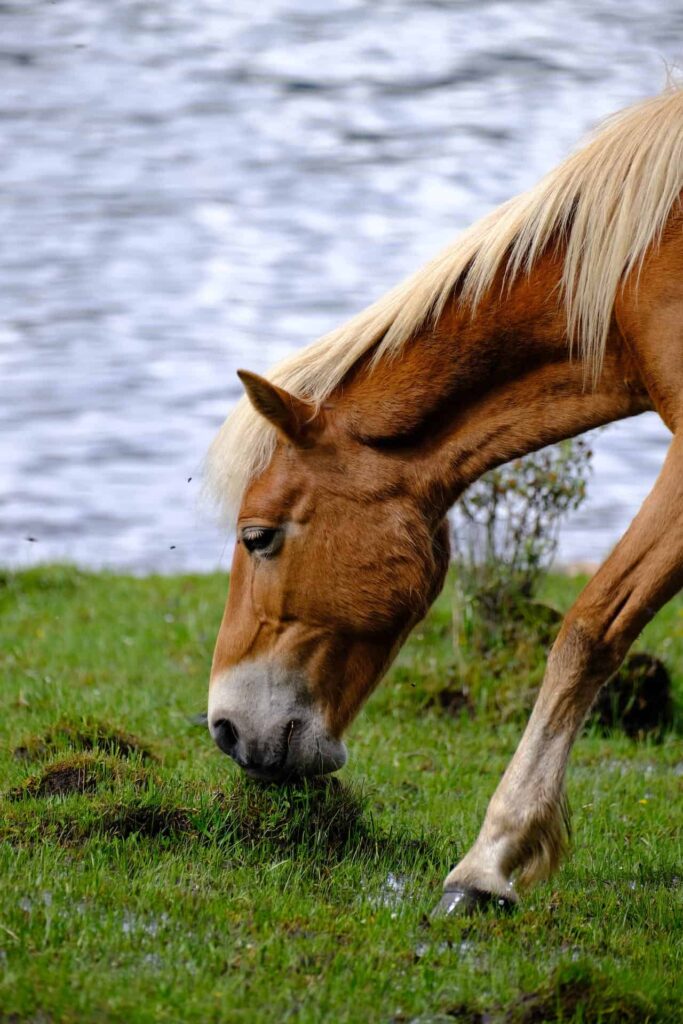
How Long Can a Horse Go Without Water
The duration a horse can go without water depends on various factors, such as the environment, activity levels, and overall health of the horse. Generally, horses need to drink water every day, and depriving them of water for an extended period can lead to serious health consequences.
A study has shown that horses may be subjected to transportation lasting up to 30 hours without water. Note that this timeframe is not ideal nor recommended, as horses are quite prone to dehydration and stress during long-distance transport. Under normal circumstances, a horse should have access to water at least every few hours to maintain its hydration and well-being.
Factors that influence a horse’s water requirements include:
- Temperature and humidity: Hot and humid environments increase a horse’s need for water due to increased perspiration.
- Activity levels: Horses that have been working hard or exercising need more water to replenish the lost fluids.
- Diet: Horses consuming a diet of dry hay typically need more water compared to those grazing on fresh grass, which contains moisture.
Keep in mind that even a short period of water deprivation can have a negative impact on a horse’s health. For instance, feed deprivation causes a reduction in water consumption, which can lead to complications like impaction colic.
While horses might be able to survive short periods without water, it is crucial to provide them with access to clean, fresh water daily to maintain good health and prevent dehydration. Restricting a horse’s access to water for longer durations can result in serious complications and should be avoided.
Water Sources and Quality for Horses
Horses require access to fresh and clean water. It’s important for horse owners and caretakers to provide suitable water sources and ensure the water quality meets the needs of their animals.
One common way to provide water for horses is through buckets or troughs. These containers should be cleaned regularly to prevent the growth of algae and bacteria. Maintaining a consistent water source helps in monitoring the horse’s water intake and identifying any changes in their consumption, which could indicate health issues.
Natural water sources, such as streams and ponds, can also be utilized for horses to drink from. Assess these sources for potential contaminants or pollutants that could harm the horses. A study has shown that poor water quality with excessive sulfate can cause sudden deaths and diarrhea in horses. Horse owners need to regularly test and monitor the quality of natural water sources before allowing their animals to drink from them.
Water quality plays a vital role in horse health, as it aids in their digestion and the absorption of nutrients from their feed. Providing clean water for horses allows them to stay hydrated and helps prevent diseases associated with dehydration. In some cases, horses under shipping stress may have a decreased water intake when they are relocated. Using flavor additives in their water can help increase their water consumption and maintain hydration under such circumstances.
Horse owners and caretakers should be aware of the various water sources and their quality to make sure horses have access to clean water. Whether using artificial containers like buckets and troughs or natural sources like streams, maintain the water quality for the welfare of the horses.
How to Maintain Proper Hydration
Horse owners should be vigilant in monitoring their horses’ hydration levels, especially during the summer months when high temperatures and increased exercise can cause dehydration. Maintaining proper hydration supports bodily functions such as regulating body temperature, maintaining healthy skin elasticity, and a steady heart rate.
To maintain proper hydration, it is important to provide horses with clean, fresh water at their stalls or pastures daily. Regular veterinarian check-ups can assess hydration status by monitoring parameters like heart rate and skin elasticity. Veterinarians can also recommend necessary adjustments to the horse’s diet, including changes in feed intake and the addition of mineral and electrolyte supplements.
Adding salt to a horse’s diet can further encourage water consumption, as it helps to replenish minerals lost through sweat. Beyond providing clean water, horse owners should monitor the quality of their horses’ feed, and be sure that it is rich in protein and grain to support health and hydration.
During the hotter months, keep an eye on a horse’s body temperature. Horses with elevated body temperatures may be at risk of overheating, which can lead to dehydration and other heat-related illnesses. Providing shade and using cooling methods such as fans and water misters can help to reduce the risk of overheating.
Maintaining proper hydration in horses requires careful observation of their behavior, regular veterinarian input, and appropriate adjustments to their diet and living environment. By monitoring these factors, horse owners can prevent dehydration and promote health.
Health Consequences of Inadequate Water Intake
Inadequate water intake can have significant effects on a horse’s health, as it is responsible for maintaining various bodily functions. When a horse doesn’t receive the necessary amount of water, it can lead to various health problems and impact its performance.
Horses require a substantial amount of water daily, depending on factors like body weight, diet, and environmental conditions. A lack of water can lead to dehydration, which impairs the horse’s ability to perspire and efficiently regulate its body temperature. This can result in an increase in respiration and ultimately lead to fatigue and muscle spasms.
Poor hydration can also affect the horse’s skin elasticity, making it more prone to wounds and infections. Insufficient water consumption can result in gastrointestinal issues such as gas and ulcers, as well as contribute to a dry mouth, affecting the horse’s appetite and general well-being.
When a horse is excessively ridden or worked without adequate rest and water intake, it can increase the risk of sickness and other health conditions. In foals and young horses, improper hydration can lead to decreased growth and development, negatively affecting their health.
In some cases, excessive drinking can also cause problems such as water intoxication. This rare condition occurs when a horse consumes a large amount of water in a short period, leading to an imbalance of electrolytes and resulting in potentially fatal organ failure. To prevent this, it is essential to monitor the horse’s water consumption and provide electrolyte supplements if needed.
It’s not just horses that experience the detrimental effects of inadequate water intake; other equines such as donkeys and mules are also susceptible to similar health risks.
Fever and other health issues can exacerbate dehydration in horses, making it even more necessary to monitor water intake during periods of sickness. Maintaining a proper hydration level is essential for a horse’s recovery and can prevent the progression of existing health conditions.
Inadequate water intake can lead to an array of health consequences in horses and other equines. Providing proper hydration, rest, and careful monitoring of water consumption can help minimize risks and promote optimal health for these animals.
Specific Cases: Donkeys and Foals
Donkeys and foals are two specific cases in the equine world that deserve special consideration when examining their water requirements. While these animals share similarities with their larger horse relatives, their water intake needs are subject to variations based on their different living conditions and biological factors.
Donkeys, for instance, often live on their own or with their foals, meaning they might need to manage their water resources more efficiently. The water requirements for donkeys are similar to that of horses, but their level of adaptive ability might have a slight influence on their tolerance for longer periods without water.
In the case of foals, their water requirements vary based on factors such as age, size, and diet. For example, newborn foals might get their water intake from the mare’s milk, which has a large free water content that they consume while nursing. As they begin to transition to solids, their water needs may increase, and the water resources provided should cater to their evolving needs.
It is important to understand that the general well-being of both donkeys and foals remains a priority. While their water needs might differ slightly, the same principles of water management apply, such as providing clean and accessible water sources and regular monitoring of their water intake. These practices will help them endure slightly longer periods without water.
By extending the same level of care and consideration as their standard horse counterparts, it is possible to cater to their unique water requirements and support donkeys’ and foals’ health in the long run.
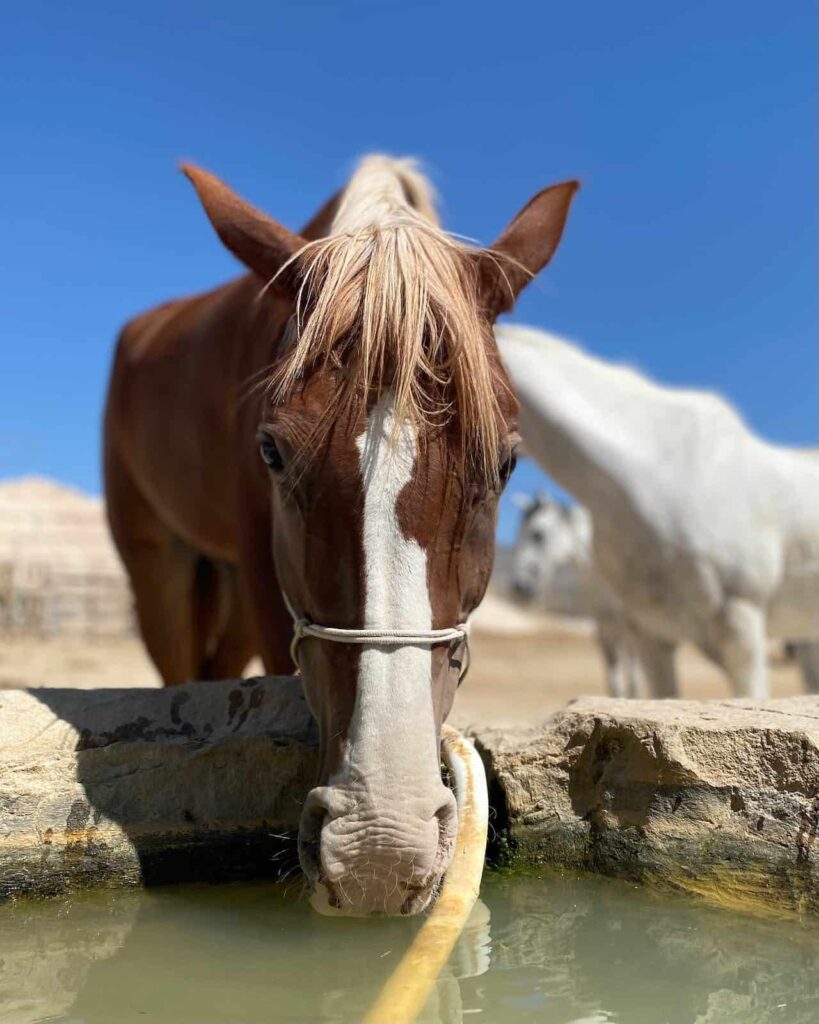
Dietary Considerations for Horse Hydration
Horses require a consistent water intake to maintain their health and prevent dehydration. Factors such as diet, nutrients, and feed intake can considerably affect a horse’s hydration level.
A horse’s feed has a direct impact on its water consumption. High forage diets primarily comprising hay, pasture, and other fiber sources can help maintain a horse’s hydration. Pasture, being a natural source of moisture, can significantly contribute to a horse’s daily water requirement. On the other hand, horses on a diet low in forage and high in concentrates such as grains may consume less water, increasing the risk of dehydration. Thus, it is necessary to provide horses with a balanced diet containing the right mix of forage, concentrates, carbohydrates, and nutrients to promote healthy hydration.
Adequate salt and mineral intake is essential for regulating water consumption and maintaining the electrolyte balance in a horse’s body. Salt for horses helps stimulate thirst and promotes drinking more water. Equine diets should include a sufficient amount of both macro-minerals (calcium, phosphorus, and magnesium) and micro-minerals (copper, zinc, and selenium) to aid in maintaining hydration.
Maintaining a horse’s nutrition plan that includes a variety of vitamins also plays a vital role in keeping them hydrated. Vitamins A, D, E, and K are fat-soluble vitamins that are crucial for equine health. Ensuring that horses consume an appropriate amount of vitamins can contribute to maintaining their hydration level.
Horses must consume an average of 5 to 10 gallons of water per day, depending on factors such as their diet, activities, and environmental conditions. During hot or humid weather, the water intake requirement may increase to prevent weight loss and dehydration. Providing readily accessible, clean water sources for horses in their pasture or stalls is a crucial aspect of ensuring they remain hydrated.
Understanding the connection between a horse’s diet and hydration is essential for their health and well-being. Offering a balanced diet with the appropriate amount of forage, concentrates, nutrients, salt, and minerals, and ensuring they have consistent access to clean water sources, can help maintain their hydration levels and prevent potential health problems.
Frequently Asked Questions
How often should horses have access to water?
Horses should have access to water at all times, as they require constant hydration for optimal health. Horses usually drink 10 to 20 times a day, and providing free access to clean water encourages them to stay well-hydrated.
What are the signs of dehydration in horses?
Signs of dehydration in horses can include a loss of skin elasticity, sunken eyes, dark or discolored urine, lethargy, and an increased heart rate. Owners can monitor their horse’s hydration status by using the skin pinch test: gently pinch the skin over the horse’s shoulder, and if the skin doesn’t flatten back quickly, it may indicate dehydration.
How much water does a horse typically consume daily?
The amount of water a horse consumes daily depends on various factors, such as size, age, diet, and climate. On average, an adult horse may drink 5 to 10 gallons of water per day. Factors like hot weather, exercise, and lactation can increase this requirement.
Can horses go longer without water during winter?
Horses may consume less water in the winter due to lower temperatures and reduced activity levels. However, water is still essential for their health. Horse owners should ensure their horses have access to clean water and monitor their water intake regularly, as dehydration can still occur during colder months.
Is it safe for a horse to be without water overnight?
It is not advisable to leave a horse without water overnight. Horses require constant access to water for proper hydration, digestion, and health. It is essential to ensure they always have access to clean water, even during nighttime hours when they are resting.
Do horses need water available in their stalls?
Yes, horses need access to water in their stalls. Providing clean water in the stall will help maintain their hydration status, support their digestive health, and reduce the risk of dehydration-related issues. Regularly checking and refilling their water sources helps ensure horses stay healthy and well-hydrated.
Last Updated on November 16, 2023 by Nate Dewsbury
